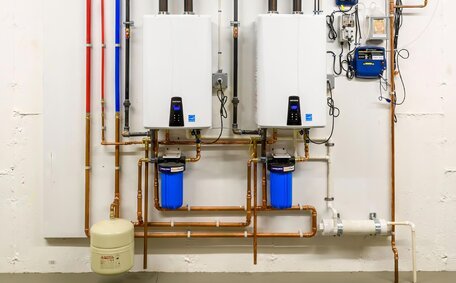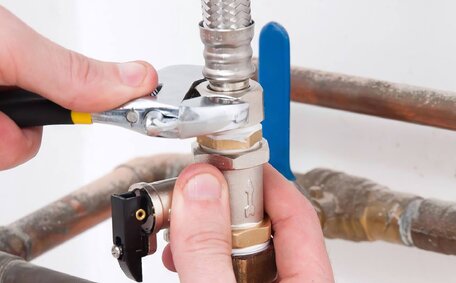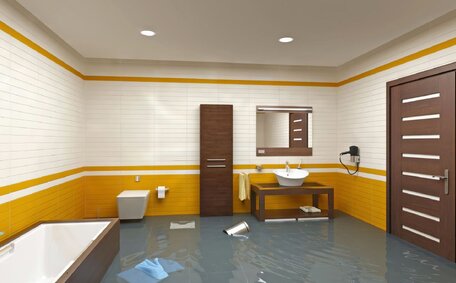Introduction to Hot Water Systems
A dependable hot water supply is a necessity for households and businesses alike. Electric hot water systems ensure an uninterrupted supply for daily activities such as bathing, cleaning, and cooking.
Choosing from the various hot water systems available – such as storage tanks that maintain a ready supply of hot water or continuous flow systems that heat water on demand – is crucial for an efficient home setup.
When choosing a hot water system, consider efficiency, running costs, environmental impact, size for your needs, and installation prerequisites.Bella Vista Plumbing specialises in all common hot water system types - electric, gas, heat pump, and solar - and can advise on the best option for your property and usage.
Our licenced plumbers boast over 25 years of expertise in the Bella Vista area, providing top-notch design, installation, and maintenance for a broad spectrum of hot water heaters. We are committed to adopting advanced technologies that offer energy-efficient and long-lasting solutions.
Main Types of Hot Water Systems
Hot water systems are broadly classified into two categories: storage tank systems and on-demand types such as continuous flow units.
Storage Tank Water Heaters
Storage hot water systems differ from instantaneous models by keeping water heated in an insulated tank for on-demand use. Water can be heated in a combination of gas hot water system units, electric systems, as well as by solar methodologies. Storage tank heaters, which may seem cost-effective upfront, can help you recognise their higher running costs over time, whether they’re running out hot or performing optimally.
Instantaneous or Continuous Flow Water Heaters
Instantaneous or tankless water heaters provide hot water without storage, although they may come with a higher initial price tag.
These systems use a heating mechanism that activates when a hot water tap is turned on, supplying on-demand hot water as cold water passes through. This on-demand design means there’s no tank to heat and maintain so they use less energy overall.
When selecting a system it’s important to balance considerations like operating costs, energy efficiency, fuel type, size to meet demand, and ease of installation and maintenance. Understanding the different type water heater options and their advantages is key to choosing the system best suited for your home.
Storage Tank Water Heaters
Unlike tankless water heaters, storage hot water systems are designed to keep a reservoir of water constantly heated and ready for use. Water is heated in an insulated tank by either gas storage hot water burners or an electric element, ensuring flexible energy source compatibility. The key advantage of gas storage hot systems is the readily available supply of hot water.
A typical four-person household usually requires a 400-litre hot water unit. Since water sits in the water tank, heat loss can be an issue. It’s crucial to flush tanks yearly and inspect sacrificial anodes to prevent corrosion.
Households with substantial hot water needs might consider tanks larger than 500 litres.
Compared to instantaneous heaters, electric storage hot water systems with water heated in storage tend to have lower upfront costs but can feature higher energy bills over time if not properly maintained. The amount of hot water stored makes them well-suited for households that need a consistent supply for tasks like running a bath.
Instantaneous/Tankless Water Heaters
Instantaneous or continuous flow hot water units provide on-demand heating without needing to store heated water in a tank. You never run out hot water with systems that heat water as you need it rather than maintaining a tank of hot water 24/7.
With tankless systems, water is rapidly heated by passing through the heater upon opening a hot tap.
Tankless systems are best suited to households with low to moderate daily mains pressure hot water usage. They can supply an endless stream of hot water, however maximum flow rates can be limited compared to storage tank systems. Tankless models also have water pressure and flow requirements to work effectively, ensuring you don’t run out of hot water suddenly.
Going tankless reduces standby heating losses, meaning less energy is wasted. Upfront costs are often higher but this can balance out over time from lower energy bills.
Overall, this type hot water system provides an energy efficient and space-saving solution for homes that may not require high flow rates. Our Bella Vista Plumbing experts are ready to guide you to the best hot water solutions tailored to your household’s unique requirements.
Heat Pump Water Heaters
Solar heat pump hot water systems, ideal for Australian conditions, draw energy from the environment to operate efficiently. They operate more efficiently than conventional electric water heaters by extracting heat from the outdoor air and transferring it indoors to heat water in an insulated storage tank.
Within the market, heat pump models are notably efficient, compared to conventional units, solar heat pump systems stand out for using around 60% less electricity, harnessing energy from the sun efficiently - saving the average household significant amounts on energy bills annually. Their operation results in fewer greenhouse gas emissions than traditional systems, enhancing their environmental friendliness. Heat pump models with a 300L tank can meet the needs of a typical 4-5 person household.
While the initial outlay may be higher, the long-term benefits can amount to much more in terms of lower running costs. Additionally, with available government rebates, a heat pump system can recoup its cost within 5 years. The outdoor unit does need to be installed in a well-ventilated spot and performs best in temperate and warm regions.
Overall heat pump systems provide a renewable and cost effective option for energy efficient hot water. Contact our team at Bella Vista Plumbing to learn more about heat pump water heater installation, costs and suitability for your home.
Solar Water Heaters
Solar water heaters utilise solar panels to harness free energy from the sun to heat water. Solar collectors, usually roof-mounted facing north, capture the radiant energy sun provides, transferring heat through a circulating fluid to an insulated storage tank.
Typically, solar water heating systems employ a booster to guarantee consistent hot water supply even during reduced sunlight. This makes them suitable for use year-round. A correctly sized solar hot water system can meet 50-80% of a household’s annual water heating needs.
Upfront costs to purchase install systems professionally are high but government rebates often subsidise $1000-$1500. With fewer moving parts and no ongoing fuel bills, lifetime costs are very low. Solar hot water works best for households with plenty of roof space; at least the size of two large single beds.
Solar water heating systems provide renewable and emissions-free hot water, representing a highly eco-friendly technology. Extensive repairs are rare and systems can last upwards of 15 years.
To learn more about solar hot water - its costs, savings, eligibility, lifespan and suitability for your property - contact our team at Bella Vista Plumbing today.
Comparing Hot Water Systems
Comparing the advantages and disadvantages of different hot water systems can inform better decision-making. Key aspects to weigh up include the pros and cons of each type water heating systems:
Upfront and Operating Costs
Gas hot water systems often have competitive initial purchase prices, opposing the common perception. Gas lpg hot water system options, heat pumps and solar units have a higher upfront cost. Operating costs differ substantially, with solar hot water being the cheapest to run, and standard electric gas tanks being more expensive to run.
Energy Efficiency Ratings
An energy star rating indicates a system’s efficiency; higher ratings denote lower energy usage for water heating, with heat pump and solar systems often achieving 5-6 star ratings.
Environmental Impact
Solar hot water and heat pump water heaters have minimal greenhouse gas emissions, unlike standard electric and gas systems which emit more. Solar hot water has the lowest environmental footprint harnessing solar heat energy.
Reliability & Lifespan
With proper maintenance, hot water systems can last over a decade; solar hot water units, being less prone to failure, can remain functional for 15-20 years. Ensure accessible service access and regular anode rod checks regardless of system type.
Household Size Suitability
Determine the appropriate system by considering your household’s hot water demand, the tank size, and flow rates; for example, heat pumps suitably service up to five people.
Storage tanks with capacities starting at 300 litres accommodate most family requirements.
Contact Bella Vista Plumbing to find the most appropriate and cost-effective hot water system, such as storage water heaters, tailored to your needs.
Upfront Costs vs Long-Term Savings
When selecting a hot water system, consider not only the initial investment and installation expenses. Energy-efficient options such as heat pumps and solar systems may cost more initially but typically lead to significant energy bill savings over time.
Standard electric water heaters with storage tanks have lower purchase prices but can incur over $300 in annual operating costs, contingent on your electricity tariff. By comparison, a heat pump or solar system typically costs $2,000-$3,000 upfront but then only $100-150 annually to run.
Over a 10 year period, a cheaper electric storage tank would cost over $4,000 total, while a pricier heat pump would be under $3,500. Solar hot water with its minimal running costs can repay its initial investment in under 5 years. This illustrates why higher short-term costs can make sense for the long term budget.
There are also rebates available from the government and energy providers to help cover the upfront investment in renewable technologies like heat pumps and solar hot water - making them even more affordable.
Despite varying budgets and requirements, the long-term savings from energy-efficient systems tailored to your needs make them a prudent choice. Consider the cumulative costs over 10-20 years beyond just the purchase price for a sound financial choice. Contact our team at Bella Vista Plumbing to explore your options.






